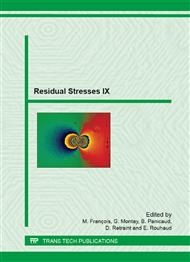p.234
p.243
p.249
p.256
p.262
p.269
p.277
p.283
p.289
Application of the Incremental Hole-Drilling Method for the Determination of Residual Stresses in Glass-Fiber Reinforced Composites
Abstract:
The incremental hole-drilling method was adapted for the measurement of residual stresses in polymer based composite materials. The parameters of the hole drilling process and the strain measurement in non-reinforced and 70 weight-percent glass-fiber-reinforced polypropylene were investigated. Calibration coefficients for the calculation of the residual stresses in the orthotropic material systems were determined by Finite Element Analysis. By means of application of the method to unidirectional and cross-ply glass-fiber reinforced composites the residual stresses, maximum measurable depths and measurement uncertainties could be derived.
Info:
Periodical:
Pages:
262-268
DOI:
Citation:
Online since:
August 2014
Authors:
Permissions:
Share:
Citation:


